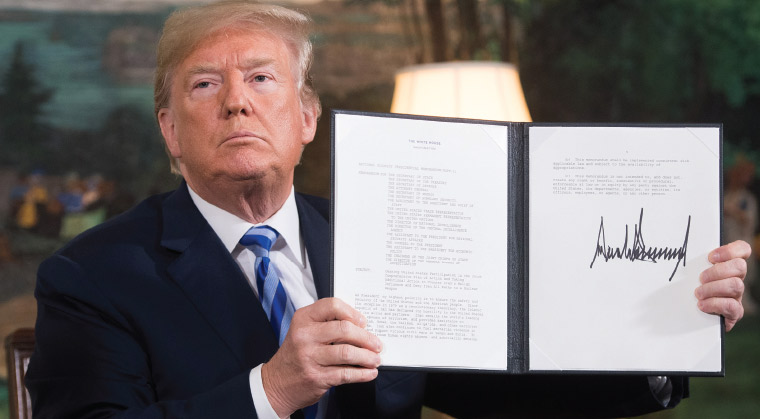The Iran Nuclear Deal Is Dead. Now What?


It’s hard to say anyone’s jaw dropped when President Trump withdrew the United States from the nuclear agreement with Iran.
Pulling out of the deal, known formally as the Joint Comprehensive Plan of Action (JCPOA), had been a Trump campaign promise. The president had further followed up on his threat with two explicit warnings to withdraw from the deal — the first in October 2017 and the second this January — unless its flaws were significantly addressed. Iran balked, and Trump made good on his promise.
The president’s address from the White House included all the Trump hallmarks: the ideological justification for the move, the common-sense explanations for the policy, and the accompanying combative rhetoric. But absent from the president’s speech was just one detail: A coherent strategy for the day after.
What happens now? The sanctions are being reimposed, that is clear. But how does Trump (and in a significant way, Netanyahu as well) plan to prevent the Iranians from achieving nuclear capability?
In his White House address, Trump invited Iran to the negotiating table. He said if the Iranians want to dismantle their nuclear and ballistic missile programs, stop engaging in and funding terror, and cease incitement against Israel, the two sides can reach a new deal. But anyone who knows even a bit about diplomacy can see that Trump’s invitation to negotiations was not genuine. Rather, it was a finger in the eye to the Iranians.
Trump’s long list of preconditions made it clear he doesn’t have any expectation of negotiating with Tehran. It’s also clear that the Iranians would never agree to even a quarter of what Trump offered. So again, we ask: Now what?
What emerges from between the lines is a clear signal, like a lighthouse on a foggy night, that the president’s policy is now regime change in Iran. If that rings a bell from years past, you might want to glance at the person who stood behind the president during his announcement — National Security Advisor John Bolton, a longtime proponent of regime change in Iran. White House lawyer Rudy Giuliani also recently told a group of activists opposed to the Iranian government that “we have a president who is as committed to regime change as we are.”
Taken together, all the various factors — the lack of a real desire for negotiations, Trump’s immediate restoration of sanctions in full force, his new White House foreign policy team — mean one thing: Trump has decided not only to withdraw from the agreement, but to implode it. When companies are deciding whether to do business with Iran or with America, the choice will be an easy one.
According to Ronen Dangoor, formerly the deputy head of the research department in Prime Minister Binyamin Netanyahu’s office, the nuclear agreement is on the verge of crumbling. “Ultimately, it will be impossible to hold on to it when there are such sanctions. It doesn’t go together,” he said. “The Iranians will say that they are being economically choked while they are meeting their commitments.”
Dangoor doesn’t expect much to happen in the coming weeks, but over the next few months, when companies stop investing in Iran and no one will sell their goods to Iran, the agreement is liable to collapse.
“There is very close coordination between Bibi’s government and the current administration, who believe that the problem needs to be solved at the root, and the root is the regime,” Dangoor explains. “The nuclear agreement gave them legitimacy. The agreement released the Iranian genie from the bottle, and Iran needs to be pressured. It is impossible to do both at the same time, pressuring them while maintaining an agreement.”
How the Iranian population will react is one question. The economy is in a tailspin and the new sanctions will only make matters worse. Will demonstrators rise up to overthrow the regime? Or will they rally around it, in defiance of the West? Dangoor said it’s too early to tell. “To say that I’m very optimistic for regime change? It might ultimately happen, but it can take many years. The regime has invested extensive efforts over many years to reach a state where it is immune to popular opposition and economic pressure; they are experienced with this. That is why I am doubtful.”
As for the regime itself, Dangoor believes its leaders will try to maintain the nuclear agreement with Europe, Russia, and China as long as they can. If all else fails, Dangoor said Iran may return to provocations and terror. “Will they begin to accumulate uranium? Maybe they will try to amass a bit of low grade enrichment uranium and will say that it is not a violation of the agreement. From then on it will get interesting. But it won’t pass without a reaction.”
(Originally featured in Mishpacha, Issue 710)
Oops! We could not locate your form.







